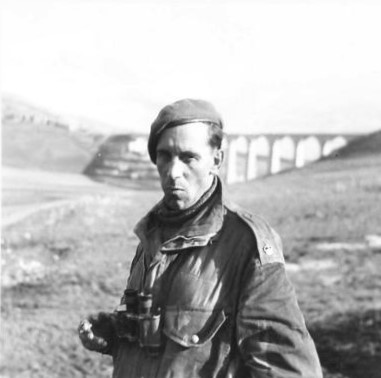An interesting description of what actually happened....
From the film ‘A Bridge Too Far’. Prisoner scene on the Bridge.
A German soldier walks across the bridge waving a white flag.
Major Carlyle: “That’s far enough, we can hear you from there.”
Major Carlyle to Lt-Col. Frost: “Rather an interesting development Sir.”
German soldier: “My General says there is no point in continuing this fighting, he is willing to discuss a surrender.”
Lt-Col. Frost to Major. Carlyle: “Tell him to go to hell.”
Major. Carlyle to the German soldier: “We haven’t the proper facilities to take you all prisoner, sorry.”
German soldier: “What?”
Major. Carlyle: ‘We’d like to, but we can’t accept your surrender. Was there anything else?”
German soldier walks away.
Lt-Col. Frost, looking at his watch: “Alright.”
The real events.
Pages 301 to 303 of ‘A Bridge Too Far’, by Cornelius Ryan.
[Tuesday, 19th September 1944]
Major-General Heinz Harmel, the Frundsberg Division commander, was irritable and more than a little frustrated. Despite constant pressure from General Bittrich, he had still been unable to bludgeon Frost and his men from the Arnhem bridge. “I was beginning to feel damn foolish,” Harmel recalls.
By now he knew that the paratroopers were nearing the end of their supplies and ammunition. Also their casualties, if his own were an example, were extremely high. “I had determined to bring tanks and artillery fire to bear and level every single building they held,” Harmel says, “but in view of the fight they were putting up, I felt I should first ask for their surrender.” Harmel ordered his staff to arrange for a temporary truce. They were to pick a British prisoner-of-war to go to Frost with Harmel’s ultimatum. The soldier selected was a newly-captured engineer, 25-year-old Sergeant Stanley Halliwell, one of Captain Mackay’s sappers.
Halliwell was told to enter the British perimeter under a flag of truce. There he was to tell Frost that a German officer would arrive to confer with him about surrender terms. If Frost agreed, Halliwell would once more return to the bridge to stand unarmed with Frost until the German officer joined them. “As a POW I was supposed to return to the Jerries as soon as I delivered the message and got the Colonel’s answer and I didn’t like that part of the business at all,” Halliwell says. The Germans brought Halliwell close to the British perimeter where, carrying the truce flag, he crossed into the British-held sector and arrived at Frost’s headquarters. Nervously, Halliwell explained the situation to Frost. The Germans, he said, believed it pointless for the fight to continue. The British were surrounded with no hope of relief. They had no choice but to die or surrender. Questioning Halliwell, Frost learned that ‘the enemy seemed to be most disheartened at their own losses.’ His own spirits lifted momentarily at the news and he remembers thinking that ‘if only more ammunition would arrive, we would soon have our SS opponents in the bag.’ As to the German request for negotiations, Frost’s answer to Halliwell was explicit, “Tell them to go to hell,” he said.
Halliwell was in full agreement. As a POW he was expected to return but he did not relish the idea of repeating the Colonel’s exact words and, he pointed out to Frost, it might prove difficult to return through the lines. “It is up to you to make that decision,” Frost said. Halliwell had already done so. “If it’s all the same with you, Colonel,” he told Frost, “I’ll stay. Jerry will get the message sooner or later.”
On the far side of the ramp Captain Eric Mackay had just received a similar invitation but he chose to misinterpret it. “I looked out and saw a Jerry standing with a not-very-white hanky tied to a rifle. He shouted “Surrender!” I promptly assumed that they wanted to surrender, but perhaps they meant us.” In the now nearly-demolished schoolhouse in which his small force was holding out, Mackay, still thinking the German was making a surrender offer, thought the whole idea impractical. “We only had two rooms,” he says. “We would have been a bit cramped with prisoners.”
Waving his arms at the German, Mackay shouted, “Get the hell out of here. We’re taking no prisoners.” The medical orderly, ‘Pinky’ White, joined Mackay at the window. “Raus!” he shouted. “Beat it!” Amid a series of hoots and cat calls, other troopers took up the cry. “Bugger off! Go back and fight it out, you bastard.” The German seemed to get the point. As Mackay recalls he turned around and walked quickly back to his own building, “still waving his dirty hanky.”
Harmel’s attempt to seek a surrender from the spirited, beleaguered men on the bridge had failed. The battle began again in all its fury.
www.canada.ca






